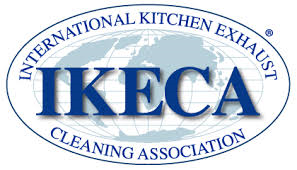Designations and certifications. How do kitchen exhaust cleaning technicians get it? Who monitors it? Is it worth it?
Unfortunately the word “certification” is being misrepresented in the commercial kitchen exhaust cleaning industry. One would think, if a company was claiming to be “Certified” then it would have employees knowledgeable and trained in what they are doing. This is not always the case.
Designations usually use letters after one’s name to denote the achievement of pre-determined standards, skills or competencies. In our company, technicians attain a designation of Professional Exhaust Cleaning Technician (PECT) through IKECA. Our crew leaders are proud to have attained this designation. A few have gone on to add certifications to this designation and become specialists in their field.
Certifications are attained by completing a professional development course or program in a specialized field. Certifications have expiration dates and require recertification. Think of First Aid, Fall Arrest or Lift Truck certifications that many of us hold. Some companies hold LEED or ISO certifications and must maintain these certifications annually.
Do your research. Always ask the company claiming to be certified, if their technicians have a professional designation. What specialization have they achieved with the certification? What organization provided the certification? Then contact that organization to ensure they are a certifying body and that that company is actually a member with certified technicians. Also ask what organization members have to do to maintain their certification. In some cases they just pay a fee and get hood stickers. Legitimate certifications must have an obligation on the members to maintain their certification by acquiring continuing education credits (CEC’s). The CEC’s will validate the technician is staying current with cleaning techniques and NFPA 96 Standards.
Pressure Kleen was the first Canadian company, over 30 years ago, to join the membership of the International Kitchen Exhaust Cleaning Association (IKECA); the first company to have a Certified Exhaust Cleaning Specialist (CECS) and a Certified Exhaust System Inspector (CESI) on staff. That means 30 years of continuing education credits to ensure we are serving our customers with the highest professionalism and cleaning restaurant kitchens to the highest standard.
Yes, it has been worth it.


11 Comments
Karan
Want to get certified for kitchen exhaust cleaning
Bill Doherty
We highly recommend getting certified with the International Kitchen Exhaust Cleaning Association (IKECA). They are recognized as the leaders in the industry for their dedication to the professional development of kitchen exhaust cleaning companies. As the past president of the Canadian chapter and a member for over 25 years, I encourage companies that wish to be the best in their field to join IKECA. Learn more at http://www.ikeca.org/
Anita
Give us a call if you need help with that process. Bill Doherty, our President will be happy to help guide you.
Raja uzair ikram
Hey I’m interested in getting IKECA certified, please send me details with price and where to go in calgary thanks
Anita
Hi Raja,
We have had interest across Canada about how to become a certified Kitchen Exhaust Cleaner. IKECA, the International Kitchen Exhaust Cleaning Association can provide the necessary tests by mail for employees of members. Several levels of certification can be achieved including Professional Exhaust Cleaning Technician (PECT), Certified Exhaust Cleaning Specialist (CECS) and Certified Exhaust System Inspector (CESI). Every IKECA member is committed to providing a complete cleaning of the entire system– from the hood in the kitchen to the fan on the roof. They follow the most complete cleaning and inspection standards in the industry found in NFPA-96, the International Mechanical Code and International Fire Code.
Many companies simply provide a quick and easy “hood cleaning” service which does not include the duct work or rooftop fan. This may keep the interior of the kitchen looking sharp, but it does little to secure fire safety and reduce health threats. They don’t clean the entire system and aren’t committed to the same high standards as IKECA members. With 55% of all restaurant fires starting in the kitchen, it is more important than ever to make sure the exhaust is cleaned by properly trained, qualified and certified professionals that are committed to clean to the highest standards in the industry.
Kian Greig
Hi i own a janitorial company and am looking to expand into cleaning hoods, where can i get trained and certified. Im in north western B.C.
Anita
Unfortunately, there is no structured class to attend. The training for kitchen exhaust systems is on-the-job training with a member organization of IKECA. Once you have obtained the kitchen exhaust cleaning skills and knowledge of NFPA-96 fire code you will be competent enough to write the write the Professional Exhaust Cleaning Technician exam. Our technicians do not attempt this exam until they have had a minimum of 6 months on-the-job training. They should have experience with various kitchen environments and have the necessary training for working at heights and confined spaces. If you have any other questions, please give us a call at 416-235-1626. Our president would be happy to speak with you about the requirements.
Orbel
I do work for 5- 6 years on a great company. I am one of the Supervisor on the company. But I will like to improve my self. I have a question.
Where in Canada can I get certified from IKECA. And after that if I can open my own business. Please let me know where, and how can I do it. Thanks so much
Anita
Hi Orbel,
Please reach out to IKECA for more information. Your company will need to become a member to certify the technicians.
Anita
Every IKECA member is committed to providing a complete cleaning of the entire system – from the hood in the kitchen to the fan on the roof and all the grease ducts in between. They follow the most complete cleaning and inspection standards in the industry found in NFPA-96, the International Fire Code.
Unfortunately, there is no structured class to attend. The training for kitchen exhaust systems is on-the-job training with a member organization of IKECA. Once you have obtained the kitchen exhaust cleaning skills and knowledge of NFPA-96 fire code you will be competent enough to write the Professional Exhaust Cleaning Technician exam. Our technicians do not attempt this exam until they have had a minimum of 6 months on-the-job training. They should have experience with various kitchen environments and have the necessary training for working at heights and confined spaces. If you are looking for experience, you will want to find an IKECA member company. For more information on the Canadian Chapter of IKECA have a look at their website Canadian Chapter of IKECA.